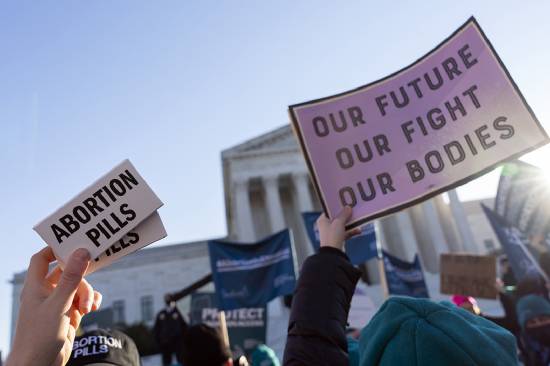With the U.S. Supreme Court’s majority ruling on Friday, abortion is no longer a constitutional right in the country. What made the development even more significant was that the decision coincided with one of the most polarized moments in American society.
Five of the Court's six judges nominated by Republican U.S. Presidents decided that abortion is not a constitutional right. Three judges nominated by the Democratic Presidents expressed opposition to the decision.
In 2018, the Jackson Women's Health Organization, the only clinic in Mississippi to perform abortion, sued the State government for restricting abortion. The case moved to the Supreme Court in 2020. The Supreme Court upheld the state administration's restriction order and overturned the 1973 "Roe v. Wade" decision, which had made abortion a Constitutional right. Chief Justice John Roberts, known as the moderate conservative, agreed with the State of Mississippi's restraining order, but disagreed with the decision overturning "Roe v. Wade."
Christian conservatives have fought for the overturning of the “Roe v. Wade” decision for nearly 50 years. Abortion was an element of the struggle between Democrats and Republicans, between liberals and conservatives. One side wants “fewer restrictions” and the other wants “more curbs.” In a process where the American identity was deconstructed, this issue has always been at the heart of the "culture wars" between the two parties. However, the pro-abortion rhetoric was more on the agenda of the mainstream wing of the Democrats in the mid-2000s.
Republican conservatives had handed over the initiative to an organization called the Federalist Society in their attempts to repeal the "Roe v. Wade" decision. Controlled by Catholic jurists, the Federalist Society played a central role in appointments to Federal Courts, including the Supreme Court. This undertaking is described as the holy alliance of Evangelical-Protestant Conservatives and Catholic Conservatives. The Federalist Society created a "personnel pool" for the Republican Party. Almost all conservative members of the Supreme Court were referred by the Federalist Society. These members are known as Catholic conservatives. Meanwhile, 2 out of 3 liberal Judges recommended by Democratic U.S. Presidents are of Jewish descent.
Three of the Supreme Court Judges were nominated by Trump. The most distinctive feature of the candidates who were referred by the Federalist Society was that they were purely anti-abortion. The Senate Majority Leader at the time, Mitch McConnell, played an important role in the confirmation of the candidates in the Senate. Conservatives applaud Trump, McConnell and the Federalist Society for the case won.
For conservatives, this case is considered even more important than winning the Presidential election. Lawyers backed by the Federalist Society made frequent attempts to overturn the "Roe v. Wade" decision. Yet, they were unable to make any significant progress until the Trump era. Thanks to the appointments made to the Supreme Court during the Trump era, they were finally able to get tangible results.
With the decision, state legislatures will now decide on abortion. So the "abortion wars" on the federal scale will now continue in the states. Republicans are calling for abortion to be banned in all states, while Democrats are calling for it to be legalized.
It's almost impossible for the Democrats to pass a "pro-abortion" bill in the Senate. The Senate is split 50 to 50. Democrats need 60 votes to pass a pro-abortion bill. They are unlikely to find 10 or 12 Republicans who would side with them. That's why the Supreme Court decision made the November elections much more important for both sides. In November, the House of Representatives will be renewed in its entirety and the Senate by one-third. Likewise, the administration of 36 states will be determined in the November elections.
No matter how the elections pan out, this issue doesn’t look like it will be resolved any time soon. It's about "American identity." The two sides have diametrically opposed views on what that means. Of course, the final solution may be a popular vote for the constitutional amendment, but this requires a "two-party compromise". Except for one or two issues, reconciliation does not seem to be among the characteristics of current politics these days. In short, the abortion wars will continue for many more years to come./agencies


